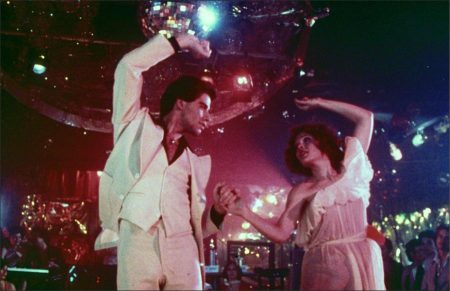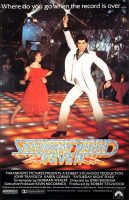Tagline: Where do you go when the record is over.
Saturday Night Fever movie storyline. John Badham’s melodramatic, out-dated film was the biggest musical sensation and blockbuster of the late 1970’s (from co-producer Robert Stigwood) – adapted by screenwriter Norman Wexler from Nik Cohn’s New York Magazine story “Tribal Rites of the New Saturday Night.”
It features one of the most famous song soundtracks in film history, and was responsible for the Disco Craze phenomenon, launching hot disco clubs (like Studio 54) and the film super-stardom of 19-year old John Travolta, previously best known as one of the Sweathogs of the television sitcom Welcome Back, Kotter.
The film’s soundtrack is the most recognizable, with a slew of high-pitched Bee Gees songs from the Gibbs: “Night Fever,” “How Deep is Your Love,” “More Than a Woman,” “You Should Be Dancin’,” and “Stayin’ Alive” (which accompanies a memorable opening scene when the working-class protagonist struts down the sidewalk to the lyrics: “Oh, you can tell by the way I walk / I’m a woman’s man, no time to talk”).
In the classic coming-of-age tale, a conflicted, teenaged Italian-American anti-hero from Brooklyn, Tony Manero (Travolta with the film’s sole Oscar nomination) works in a dead-end job as a clerk in a local hardware store and lives at home with his oppressive, verbally-abusive blue-collar family. But after dark, he becomes the dynamic, white polyester-clad stud (with platform shoes, flared pants, and a wide-collared shirt) and undisputed dancing legend of a local nightclub (the 2001 Odyssey), with dancing partner Stephanie (Gorney) for a dance contest.
The uneducated macho Manero seeks escape from his desperate plight of a staid home life and unambitious friends by finding recognition on the dance floor. However, his swaggering, troubled character also expresses arrogance, racism, immaturity, obnoxiousness, and misogyny (he sexually abuses and disregards girlfriend Annette (Pescow).
Additional popular songs on the soundtrack included Yvonne Elliman’s “If I Can’t Have You” and the Trammps’ “Disco Inferno.” Unbelievably, the soundtrack was completely ignored by the Academy, causing a critical outcry and leading to the extremely unlikely Oscar win by the next year’s inferior disco film Thank God It’s Friday (1978)’s for “Last Dance” (sung by Donna Summer). An inferior sequel, director Sylvester Stallone’s Staying Alive (1983) also starred Travolta reprising his Tony Manero role.
Saturday Night Fever is a 1977 American musical drama film directed by John Badham. It stars John Travolta as Tony Manero, a working-class young man who spends his weekends dancing and drinking at a local Brooklyn discothèque; Karen Gorney as Stephanie Mangano, his dance partner and eventual confidante; and Donna Pescow as Annette, Tony’s former dance partner and would-be girlfriend. While in the disco, Tony is the champion dancer. His circle of friends and weekend dancing help him to cope with the harsh realities of his life: a dead-end job, clashes with his unsupportive and squabbling parents, racial tensions in the local community, and his general restlessness.
The story is based upon a 1976 New York magazine article by British writer Nik Cohn, “Tribal Rites of the New Saturday Night”; in the mid-1990s, Cohn acknowledged that he fabricated the article. A newcomer to the United States and a stranger to the disco lifestyle, Cohn was unable to make any sense of the subculture he had been assigned to write about; instead, the character who became Tony Manero was based on an English mod acquaintance of Cohn.
Saturday Night Fever (1977)
Directed by: John Badham
Starring: John Travolta, Karen Lynn Gorney, Barry Miller, Donna Pescow,, Julie Bovasso, Martin Shakar, Sam Coppola, Nina Hansen
Screenplay by: Norman Wexler
Production Design by: Joseph Cali
Cinematography by: Ralf D. Bode
Film Editing by: David Rawlins
Costume Design by: Patrizia von Brandenstein
Set Decoration by: George DeTitta Sr.
Music by: Barry Gibb, Maurice Gibb, Robin Gibb
MPAA Rating: R for strong language, sexuality/nudity and some drug content.
Distributed by: Paramount Pictures
Release Date: December 14, 1977
Views: 376

